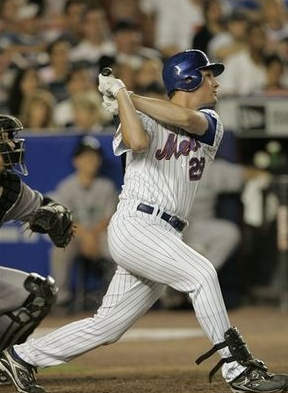 Instant replay - it may be the most consequential in-game sports technology innovation that the United States' national pastime has seen since the Chicago Cubs discovered light bulbs, and today it's taking center stage.
Instant replay - it may be the most consequential in-game sports technology innovation that the United States' national pastime has seen since the Chicago Cubs discovered light bulbs, and today it's taking center stage.Much of the sports talk in the New York area is revolving a controversial umpiring decision from last night's New York Mets-Washington Nationals game.
With a man on and nobody out in the bottom of the sixth inning, the Mets' Daniel Murphy smacked a Jordan Zimmerman pitch on a high arc out to right field - a position that Little Leagues designate for uncoordinated children, but which in the bigs usually calls for strong armed, power hitters like the Nats' Adam Dunn.
Dunn drifted back on the ball and eventually turned around to face the outfield wall. The ball appeared to change direction in its descent, and the outfield umpire's initial call was that it was a double. That call, had it stood, would have changed the complexion of the inning and perhaps the outcome of the game, since the runner on base when Murphy connected - Gary Sheffield - was out trying to score on what he thought, as he loped around the bases, was a home run.
But the umpires - as they are allowed to this year, for the first time in baseball history - disappeared into a room with a monitor and came back to signal "home run." Apparently, the umps decided that the ball had hit a billboard that hangs over the lower decks in right at the Mets' new stadium, Citi Field. (That bit of construction is a tribute, some baseball historians say, to the one of the Mets' forerunners in New York City, the mighty New York Giants, whose home, Manhattan's Polo Grounds, featured an overhang.)
There are a lot of interesting things to talk about here. First, it's interesting that even with instant replay, there appears to be little conclusive evidence that Murphy's home run was in fact a home run. The ball somehow changed direction, clearly, but it isn't clear how that happened. It's also interesting that the umpires found strong enough evidence - when broadcast teams couldn't - that the initial signal for a double could be overturned.
Now many of us who own cell phones and smartphones know by now that the devices are equipped with increasingly strong video camera functionality. Digital cameras all are capable of doubling as camcorders. Some of us - though we're not supposed to, because the broadcasting rights to MLB games are not ours - even sneak devices such as Pure Digital Technologies' (now Cisco's) Flip-brand camcorders into the ballpark.
To me - and to many baseball purists, I am sure - one of the truly annoying consequences of cell phones in ball parks rears its ugly head when people who can afford really good seats wave to their friends while talking on the phone. It happens when batters step into the box - a moment when TV broadcast teams flash a hitter's statistics and come in for a close up. For right-handed hitters, the background during that close-up is the third base line; for left-handed hitters, the first base line.
Knowing that they're on TV, fans who shell out big bucks for those seats take the opportunity to wave from the background - presumably to the same people they're talking to on the phone. For them, I suppose, getting good seats to a baseball game is little more than an opportunity to snatch some TV time on a local sports channel.
What I think is this, and you can tell me if you agree: Baseball teams should allow recording devices into the stadiums (they can't really stop people anyway, considering the multi-functionality of things like RIM BlackBerry smarpthones or the iPhone) - and use the footage they record to help the umpires make better decisions.
Last night, for example, a Citi Field designated employee could have wandered down the right field line and - while the umpires were taking their time making up their minds about Murphy's home run - taken a peek at some of the footage that fans in that area had gathered.
I know that may sound impractical - and maybe it is - since, as we hear time and again, the game of baseball is long enough.
But if MLB Commissioner Bud Selig and the umpires really want to get their calls correct, shouldn't they have all the evidence they need at hand?
What would Adam Dunn say?







